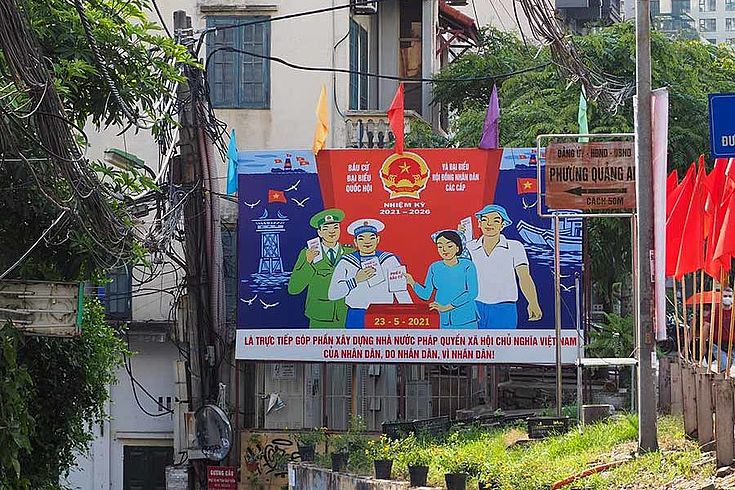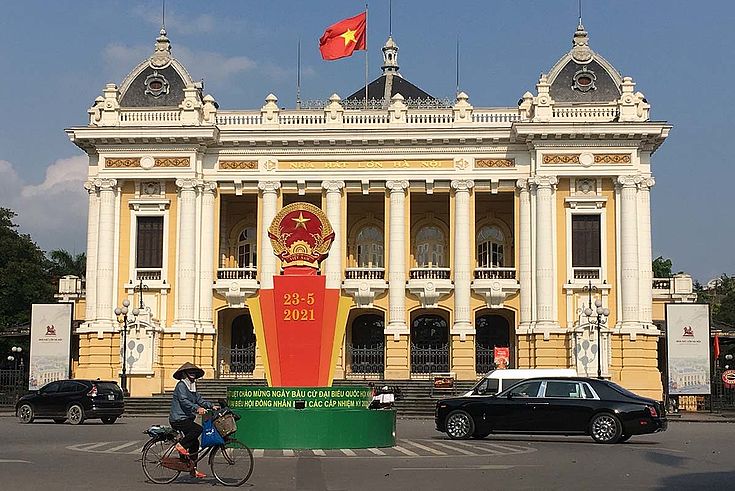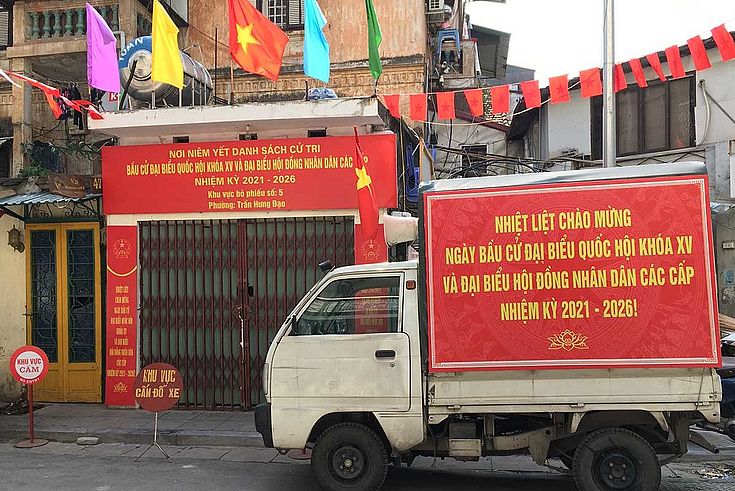National Elections in Vietnam
Propaganda posters, which can be found all over Vietnam, call on citizens to vote for the National Assembly and the People's Councils.
HSF
"Voting is the right and duty of every citizen" – this is the early morning message sounding from loudspeakers in the Vietnamese capital Hanoi as the state administrative apparatus prepares for the election of the National Assembly for the next five years. 2021 is a year full of political highlights for Vietnam: First, the National Congress of the Communist Party of Vietnam (CPV) was held in January to determine the political leadership positions. In addition, elections for the deputies of the National Assembly as well as members of the people's councils, the legislative branch of the provinces, will take place at all administrative levels – the provincial, district and communal levels. Both the election process itself as well as the preparations for the elections follow strictly defined guidelines. How important are these elections for the country and what are its consequences?
What is the National Assembly of Vietnam?
Vietnam is a socialist republic with a one-party system. To talk about elections and conventional parliamentary work in this context may seem surprising at first. Vietnam's political power structure is divided into three pillars: The Communist Party of Vietnam (CPV), the government, and the country's parliament, the so-called National Assembly. The National Assembly is Vietnam's highest constitutional body and the legislative branch of the country. According to the Vietnamese constitution, it oversees many important political functions, such as electing the president (Nguyen Xuan Phuc), the prime minister (Pham Minh Chinh) or the judges of the Supreme Court. With the ability to pass new laws or amend existing ones, the de-jure legislative duties of the National Assembly are the same as those of other parliaments. The National Assembly also has the power to amend the Vietnamese constitution and therefore plays a politically important role in the country.
Since the reunification of North and South Vietnam in 1976, the National Assembly has been elected every five years. During these elections, it often becomes abundantly clear that not only the National Assembly, but the Communist Party of Vietnam in general plays an immensely important role in the country and has a major influence on political events. This is particularly evident in the selection of the candidates for the elections of the National Assembly.
Who are the candidates and how are they selected?
The elections of the National Assembly are preceded by thorough preparations. In January 2021, the “National Election Council” was set up, which is responsible for overseeing the elections and circulating necessary guidelines for the electoral process. In addition, there are “Election Committees” for each of the 63 provinces of Vietnam, which oversee the elections of the members of the People's Councils.
The most important role in this context, however, is held by the so-called “Vietnam Fatherland Front” – an umbrella organization of various pro-government mass organizations in Vietnam that are closely linked to the Communist Party of Vietnam. In preparation for the elections, the “Fatherland Front” organized three consultative conferences, where it pre-selected the candidates who could then stand for election. 868 out of 1084 possible candidates made it through the selection process and onto the final list for this year`s election.
The selection of candidates takes into consideration various factors . Representatives from the regions of North, Central and South Vietnam are to be represented in balanced numbers. At least 18% of the candidates must belong to an ethnic minority, and at least 35% of the seats must be held by women. Quotas are also set for different organizations and institutions. Ministries of the central government put forward candidates, as do, for example, unions, the military or the farmers' association. The exact distribution is determined in advance by the National Election Council. 90% of the candidates should belong to the CPV, while 10% are reserved for candidates who are not members of the party. This year, 74 candidates are non-party candidates, which represents 8.5% of all candidates.
The date of the election is announced in front of the Opera House, a landmark of the capital of Vietnam, Hanoi.
HSF
Who elects whom, and how?
On May 23rd, nationwide elections will be held in a total of 184 constituencies. For each constituency, a maximum of 5 members can be elected for the local People's Councils and a maximum of 3 deputies for the National Assembly. The exact number of members of the People's Councils depends both on the population of each province, and on the level of the voting – whether elections are held at the provincial, district or communal level. The number of deputies per province is determined in advance by the National Assembly.
Polling stations are set up in each district, designed to accommodate between 300 and 4000 voters, depending on their size and location. At these polling stations, voters can register with their voting cards and cast their ballots. Unlike in most other countries, voters do not mark the candidate they want to vote for, but cross out the candidates they do not want to vote for.
According to the constitution, every Vietnamese citizen over the age of 18 is eligible to vote. In the past elections, according to official numbers, the voter turnout has been constant at about 99%. In this context, it is important to note that it is common in Vietnam to leave the actual voting process to the head of the family or household. In most cases, the oldest male member of the household votes on behalf of the entire family.
This year`s campaigning was overshadowed by the Covid-19 pandemic and the 4th wave that has hit Vietnam since the end of April. Nevertheless, the Fatherland Front – together with the election committees – organized various offline and online conferences where voters were able meet their potential representatives. At these meetings, voters were informed about the biographies and action plans of the candidates for the 15th National Assembly and had the opportunity to discuss certain topics with the candidates.
What trends are discernible within the National Assembly?
In recent years, developments have emerged that indicate a cautious trend towards more legislative control and an institutional assertiveness of the National Assembly, which has been able to emancipate itself to a certain degree from the strong control the executive branch. For instance, this can be seen in the fact that many officers and ministers have had to justify themselves in court due to allegations of corruption. Even though the numerous corruption trials of high-ranking government officials can be traced primarily to the anti-corruption campaign of CPV Secretary General Trong, the convictions can certainly be linked to an increase in the power of the National Assembly.
The selection criteria for the candidates for the National Assembly have also changed: On the one hand, the quotas for female candidates and candidates from ethnic minorities have been increased. On the other hand, the trend towards electing more candidates under the age of 40 to the National Assembly seems to have stagnated in comparison to previous elections. In the last legislative period, for example, 71 seats were reserved for these younger candidates, but only 50 were ultimately elected. This year, only 50 seats are planned for younger candidates from the outset, even though the high age of the deputies is already a major challenge for the National Assembly of Vietnam, which needs to be addressed. Due to their age, many deputies only stay for one legislative term. Less than a quarter of the candidates standing for election this year were already deputies in the previous legislative term. This high staff turnover leads to a limited effectiveness of the National Assembly. In addition, a relatively low proportion of deputies are full-time deputies. This year, the percentage of full-time deputies is expected to increase from 34% to about 40%. The trend towards more professionalization is pointing in the right direction, but it still means that the majority of deputies pursue other full-time professions.
Spreading the information about the elections
HSF
What impact will the elections have on Vietnam's political direction?
The elections for the National Assembly are one of the most important political events in Vietnam. Nevertheless, there are no major changes or surprises to be expected in the elections’ outcome. Rather, the preparation and procedure of these elections once again demonstrate strong control by the government and the party. What was already initiated at the beginning of the year during the party congress, will only be confirmed in the middle of the year. The elections provide a democratic appearance of legitimacy to the personnel decisions made by the party congress, as all leadership positions will be approved by the new National Assembly following the elections. Rejections however are not intended. The results of the party congress therefore greatly overshadow the elections.
In terms of foreign policy, the government will probably try to maintain a friendly political relationship towards its “big brother” China, despite China`s increasingly aggressive stance in the conflict in the South China Sea (in Vietnam, the East Sea). Still, as anti-China sentiments are omnipresent among the Vietnamese population, reconciling these two interests is likely to be a challenge for the new political leadership in the upcoming years. Not least because of that, it will be important for Vietnam to further expand its cooperation with the EU as well as the US. Vietnam is actively seeking international partners in the simmering conflict in the South China Sea, but both the EU and the US have repeatedly expressed their concerns about the difficult human rights situation and limited civic participation in Vietnam. It is eagerly awaited to see how the new Prime Minister Chinh will navigate this highly sensitive environment as head of government. Despite some remaining questions about democratic legitimacy, the approval of the new leadership by the National Assembly in the aftermath of the elections will provide the new government with a mandate to govern the country.
About the author:
Magdalena Knödler studied International Cultural and Business Studies with focus on Southeast Asian studies at the University of Passau, Germany. She now works as a freelance consultant. The opinions stated in this article are the ones by the author and do not necessarily express the views of Hanns Seidel Foundation or its staff.
A series on the facts about the elections in Vietnam
Election Timeline
Who are the Candidates



